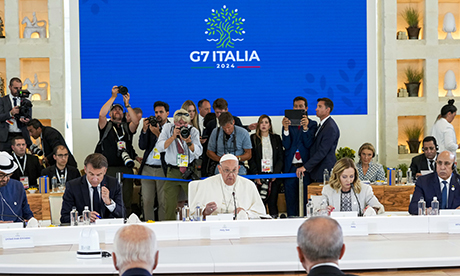Pope Francis addressed the G7 summit in Puglia, Italy, where he gave a speech focusing on the complex impact of artificial intelligence (AI), emphasising its significant potential and considerable risks.
Francis is the first Pope to address the forum, bringing together leaders of the US, UK, Italy, France, Canada, Germany and Japan.
The Pope was invited to address the G7 by its host, Italian Prime Minister Giorgia Meloni. Meloni said that she hoped global leaders would benefit from the Vatican’s ongoing ethical reflections on the usage of AI.
Balancing AI’s potential and risks
In his speech, Pope Francis referred to AI as a “cognitive-industrial revolution” with the power to transform society. He acknowledged the benefits of AI such as democratising knowledge, advancing scientific research and alleviating labour.
However, he also warned of the significant risks associated with AI, including increased inequality and the erosion of human dignity.
Pope Francis introduced the “techno-human condition” concept, highlighting humanity’s intrinsic connection to its tools.
He argued that this relationship opens humans to external realities and to God, fostering creativity and intellectual growth.
Emphasising ethical discernment, the Pope distinguished between human wisdom and algorithmic choices, stressing that critical decisions, especially those involving human life, should remain under human control due to AI’s lack of moral judgement.
Ethical standards and global consensus
The Pope highlighted that AI algorithms are neither objective nor neutral, often leading to reductive judgments. He cited examples such as judicial decisions influenced by data points like ethnic origin and credit rating, warning against the risks of overlooking human potential for moral growth.
Expressing concern over students using AI to write essays, Pope Francis warned that AI-generated content lacks true creativity and undermines genuine educational experience. He emphasised the importance of fostering authentic reflection rather than merely repeating existing concepts.
Pope Francis called for developing “algor-ethics”, a global set of principles to guide AI’s ethical use.
Acknowledging the challenge of achieving consensus on social issues, he stressed the need for shared ethical standards across cultures and institutions.
“If we struggle to define a single set of global values” the Pope said, we can at least “find shared principles with which to address and resolve dilemmas or conflicts regarding how to live”.
Sources
Additional readingNews category: World.




